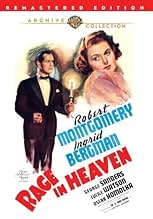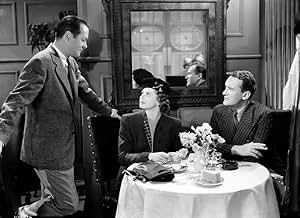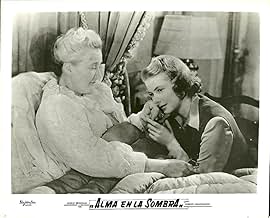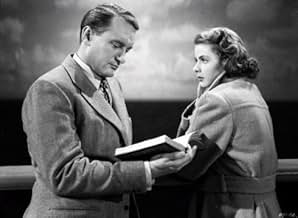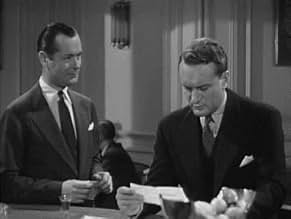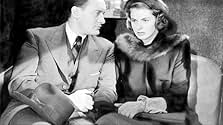NOTE IMDb
6,4/10
1,4 k
MA NOTE
Ajouter une intrigue dans votre langueRobert Montgomery and George Sanders team up to play against type in this probing psychological thriller that features Ingrid Bergman as the object of their obsessions.Robert Montgomery and George Sanders team up to play against type in this probing psychological thriller that features Ingrid Bergman as the object of their obsessions.Robert Montgomery and George Sanders team up to play against type in this probing psychological thriller that features Ingrid Bergman as the object of their obsessions.
- Réalisation
- Scénario
- Casting principal
- Récompenses
- 3 victoires au total
Frederick Worlock
- Solicitor-General
- (as Frederic Worlock)
Ludwig Hardt
- Durand
- (as Ludwig Hart)
Stuart Hall
- Traveling Salesman
- (scènes coupées)
Major McBride
- Bank Clerk
- (scènes coupées)
Clive Morgan
- Traveling Salesman
- (scènes coupées)
Joseph North
- Undertaker
- (scènes coupées)
Wyndham Standing
- Dr. McTernan
- (scènes coupées)
Harry Allen
- Jury Foreman
- (non crédité)
Avis à la une
''Rage in Heaven'' wasn't a bad movie, but it wasn't good either...... I'm not sure, if it's because of the story, or because of the actors performances...... Ingrid Bergman was fine...... You could tell, that she tried to make the best of it, but there was NO chemistry at all, between her and Robert Montgomery, George Sanders...... Montgomery looks tired, and seems to be sleepwalking through the movie...... He downplayed his mentally disturbed character too much...... He seemed more alert, towards the last half of the film...... From what I read, in Ingrid Bergman's autobiography, she said, that Montgomery was forced to do this movie, so he told her, that he won't act..... That probably explains his bored looks in the movie...... Overall, could've been a better movie, if they rearranged the cast or something.......
The first half of this film is a fascinating portrayal of a Paranoid Psychopath. The second half deteriorates into an in-earnest attempt to deliver a thoughtful look at someone suffering from this form of mental illness.
Ingrid Bergman, in her third Hollywood feature, is the subject of a dangerous obsession from her husband, a wealthy heir, who lacks self-esteem and lives in a constant state of jealously and prone to being easily agitated. Robert Montgomery plays the ticking bomb.
Parenthetically, Montgomery was reportedly unhappy the studio demanded he play the role because he wanted time off and therefore delivered his lines quickly and without much effort. I found this to be, ironically, effective for the character.
The great George Sanders plays the man in most danger of the lead character's pathological illness. Unfortunately, his character is given little to work with in the third act of the film.
There's a scene where a trial is held and the apathy displayed by Sanders (with the exception of one shot) is astonishing.
In the 1940s Hollywood began its fascination with stories focused on psychology. This is one of the first films in that era and unfortunately it was put in the hands of director W. S. Van Dyke, who had the reputation of working quickly and was nicknamed "One-Take Van Dyke." You can see characters trip over lines and a lack of care over the story's plot line.
Oscar Homolka seriously overplays the mental health doctor in the picture. Clearly the rage over the film's miscues should be directed at Van Dyke.
Ingrid Bergman, in her third Hollywood feature, is the subject of a dangerous obsession from her husband, a wealthy heir, who lacks self-esteem and lives in a constant state of jealously and prone to being easily agitated. Robert Montgomery plays the ticking bomb.
Parenthetically, Montgomery was reportedly unhappy the studio demanded he play the role because he wanted time off and therefore delivered his lines quickly and without much effort. I found this to be, ironically, effective for the character.
The great George Sanders plays the man in most danger of the lead character's pathological illness. Unfortunately, his character is given little to work with in the third act of the film.
There's a scene where a trial is held and the apathy displayed by Sanders (with the exception of one shot) is astonishing.
In the 1940s Hollywood began its fascination with stories focused on psychology. This is one of the first films in that era and unfortunately it was put in the hands of director W. S. Van Dyke, who had the reputation of working quickly and was nicknamed "One-Take Van Dyke." You can see characters trip over lines and a lack of care over the story's plot line.
Oscar Homolka seriously overplays the mental health doctor in the picture. Clearly the rage over the film's miscues should be directed at Van Dyke.
This psychological thriller involved a leading man who was brooding over his perceived mistreatment by MGM (Robert Montgomery), and a director, Woody Van Dyke, who was having a difficult physical and emotional time of it to the point that two other directors had to get involved. And yet it worked overall, although I feel it could have pulled together better than it did with a more cohesive vision.
Montgomery had said he was not going to act in this one, just read his lines. Yet his detached demeanor actually works as he is portraying Phillip Monrell, a man whose paranoia comes out of nowhere. He is the charming Robert Montgomery character of the high society comedies for the first 30 minutes of the film. And then becomes - without explanation - very paranoid. He has been overseas, only to return to England, meet, and marry his ailing mother's paid companion, Stella Bergen (Ingrid Bergman), in a whirlwind courtship. Ingrid you have to stop marrying in haste! You got lucky with Victor Lazslo in "Casablanca", but not this time!
And Monrell is most of all jealous of his long time "friend", engineer Ward Andrews (George Sanders). He begins to think his wife and Ward are having an affair. And this seems laughable as Sanders is for once portraying somebody who is admirable and completely guileless. Or is he??
There is a mystery patient at an insane asylum who escapes at the beginning of the film. You never see his face. And this never comes up until the end when a doctor there, Oscar Homolka, shows up at a crucial juncture. He is a very welcomed presence as he assaults a shopkeeper with his umbrella so an important phone call can be made.
Definitely worth watching. But there is just an odd lack of chemistry between the leads.
Montgomery had said he was not going to act in this one, just read his lines. Yet his detached demeanor actually works as he is portraying Phillip Monrell, a man whose paranoia comes out of nowhere. He is the charming Robert Montgomery character of the high society comedies for the first 30 minutes of the film. And then becomes - without explanation - very paranoid. He has been overseas, only to return to England, meet, and marry his ailing mother's paid companion, Stella Bergen (Ingrid Bergman), in a whirlwind courtship. Ingrid you have to stop marrying in haste! You got lucky with Victor Lazslo in "Casablanca", but not this time!
And Monrell is most of all jealous of his long time "friend", engineer Ward Andrews (George Sanders). He begins to think his wife and Ward are having an affair. And this seems laughable as Sanders is for once portraying somebody who is admirable and completely guileless. Or is he??
There is a mystery patient at an insane asylum who escapes at the beginning of the film. You never see his face. And this never comes up until the end when a doctor there, Oscar Homolka, shows up at a crucial juncture. He is a very welcomed presence as he assaults a shopkeeper with his umbrella so an important phone call can be made.
Definitely worth watching. But there is just an odd lack of chemistry between the leads.
A somber-hued melodrama whose psychology is more compelling than its dramaturgy, Rage in Heaven sounds many of the minor-key motifs and dark timbres that would shortly coalesce into the noir cycle. Its most striking aspect has to be its acceptance of its disturbed central character as a given, without attempting to supply a neat, reassuring `explanation.'
The story set in England, for no good reason opens with a teasing prelude at a French insane asylum. But soon, in London, we meet up with Robert Montgomery as he meets up with old chum George Sanders and whisks him off to the country house of Montgomery's widowed mother (Lucile Watson), who in ailing health has retained the services of a companion (Ingrid Bergman). Though Bergman and Sanders generate some electricity, when he departs she marries Montgomery. This proves ill-advised.
Montgomery, who reluctantly has taken charge of the family's steel works, shows himself to be not only incompetent, irrationally jealous and vindictive, but also self-loathing, desperately insecure, and (as it turns out, like his father) suicidal. He requires unquestioned obedience, even at the risk of running his business into the ground or poisoning his marriage. He lures back Sanders in order to validate his suspicions of an affair between his wife and his best friend but, when no evidence emerges, devises a fiendish plot to ruin all their lives. His plans almost succeed, but for an eleventh-hour deus ex machina, in the person of the head of that sanitarium in the outskirts of Paris.
Though somewhat cleverly contrived, the ending remains a contrivance yet doesn't quite invalidate the movie's dark vision (perhaps owing more to Christopher Isherwood, who wrote the screenplay, than to James Hilton's novel). Montgomery elects to play a charming villain, as he did in Night Must Fall, perhaps unsure of just how to depict a deranged psyche (he wasn't far off the mark). Sanders gets wasted as a square-rigger, which was never his long suit.
That leaves the radiant Bergman, two years before Casablanca assured her stardom, handed the thankless world of the loyal, longanimous wifey. In this flawed but unsettling and precocious melodrama, it's she who utters the final benediction. That benediction lingers in the mind as an enlightened touch and a far cry from the black/white mentality of today's thrillers, which view psychological aberration as just a more heinous kind of evil, and so a further justification for triumphantly exterminating the evildoers.
The story set in England, for no good reason opens with a teasing prelude at a French insane asylum. But soon, in London, we meet up with Robert Montgomery as he meets up with old chum George Sanders and whisks him off to the country house of Montgomery's widowed mother (Lucile Watson), who in ailing health has retained the services of a companion (Ingrid Bergman). Though Bergman and Sanders generate some electricity, when he departs she marries Montgomery. This proves ill-advised.
Montgomery, who reluctantly has taken charge of the family's steel works, shows himself to be not only incompetent, irrationally jealous and vindictive, but also self-loathing, desperately insecure, and (as it turns out, like his father) suicidal. He requires unquestioned obedience, even at the risk of running his business into the ground or poisoning his marriage. He lures back Sanders in order to validate his suspicions of an affair between his wife and his best friend but, when no evidence emerges, devises a fiendish plot to ruin all their lives. His plans almost succeed, but for an eleventh-hour deus ex machina, in the person of the head of that sanitarium in the outskirts of Paris.
Though somewhat cleverly contrived, the ending remains a contrivance yet doesn't quite invalidate the movie's dark vision (perhaps owing more to Christopher Isherwood, who wrote the screenplay, than to James Hilton's novel). Montgomery elects to play a charming villain, as he did in Night Must Fall, perhaps unsure of just how to depict a deranged psyche (he wasn't far off the mark). Sanders gets wasted as a square-rigger, which was never his long suit.
That leaves the radiant Bergman, two years before Casablanca assured her stardom, handed the thankless world of the loyal, longanimous wifey. In this flawed but unsettling and precocious melodrama, it's she who utters the final benediction. That benediction lingers in the mind as an enlightened touch and a far cry from the black/white mentality of today's thrillers, which view psychological aberration as just a more heinous kind of evil, and so a further justification for triumphantly exterminating the evildoers.
One of James Hilton's lesser novels got a lesser production from MGM with his Day Of Reckoning becoming Rage In Heaven. This has to be one of the few instances where a psychiatrist saves the day.
I think it ironic that Robert Montgomery got cast in the lead here against his usual type. It must have been an easier sell to Louis B. Mayer to cast him after having proved his acting chops in Night Must Fall. Playing another charming maniac got Montgomery an Academy Award nomination in that film. So Mayer having been convinced was less reluctant to have him cast here.
When we first meet Montgomery we find him inside an insane asylum in France and while his doctor, Oscar Homolka is discussing his case, Montgomery up and escapes from the place. Making it back to Great Britain he goes back to his mother's place and Lucille Watson as the mother welcomes him, not knowing of his hiatus in the booby hatch.
She's got a nice new secretary/companion in Ingrid Bergman and Montgomery likes her lot. She likes George Sanders his good friend and incidentally it was Sander's character name under which Montgomery was in the asylum under.
Montgomery woos and wins Ingrid, he's now running Watson's factory and that makes him a big man and no doubt helps his cause with Ingrid. Sanders is now working for him. But this Othello has his own Iago inside him provoking the green eyed monster without any outside provocation.
When Bergman turns to Sanders after one of Montgomery's inexplicable rages, Montgomery conceives a diabolical plot to frame Sanders for his own murder. That's the best part of the film, there's no way Sanders could have or should have gotten out of it. Especially without Montgomery to be questioned.
I liked the fact that both Montgomery and Sanders were playing against type. Sanders is a good guy, one of the few films he's not working any angles. Ingrid was steadfast and loyal, her part's not that much of a stretch for her talents.
I won't give away the ending, but let me say it was way too contrived and coincidental. Rage In Heaven does not belong in the top tier of films for any of the three leads.
I think it ironic that Robert Montgomery got cast in the lead here against his usual type. It must have been an easier sell to Louis B. Mayer to cast him after having proved his acting chops in Night Must Fall. Playing another charming maniac got Montgomery an Academy Award nomination in that film. So Mayer having been convinced was less reluctant to have him cast here.
When we first meet Montgomery we find him inside an insane asylum in France and while his doctor, Oscar Homolka is discussing his case, Montgomery up and escapes from the place. Making it back to Great Britain he goes back to his mother's place and Lucille Watson as the mother welcomes him, not knowing of his hiatus in the booby hatch.
She's got a nice new secretary/companion in Ingrid Bergman and Montgomery likes her lot. She likes George Sanders his good friend and incidentally it was Sander's character name under which Montgomery was in the asylum under.
Montgomery woos and wins Ingrid, he's now running Watson's factory and that makes him a big man and no doubt helps his cause with Ingrid. Sanders is now working for him. But this Othello has his own Iago inside him provoking the green eyed monster without any outside provocation.
When Bergman turns to Sanders after one of Montgomery's inexplicable rages, Montgomery conceives a diabolical plot to frame Sanders for his own murder. That's the best part of the film, there's no way Sanders could have or should have gotten out of it. Especially without Montgomery to be questioned.
I liked the fact that both Montgomery and Sanders were playing against type. Sanders is a good guy, one of the few films he's not working any angles. Ingrid was steadfast and loyal, her part's not that much of a stretch for her talents.
I won't give away the ending, but let me say it was way too contrived and coincidental. Rage In Heaven does not belong in the top tier of films for any of the three leads.
Le saviez-vous
- AnecdotesW.S. Van Dyke took over the direction of the movie from Robert B. Sinclair, who became ill shortly after shooting began. Van Dyke was in the Marines, but was granted a 14-day leave to finish the picture. Neither Sinclair nor Van Dyke was available for re-takes, which were then directed by Richard Thorpe.
- GaffesThe movie commences with a quote, "Heaven hath no rage like love to hatred turned", which it attributes to Milton. The quote is in fact from William Congreve's play "The Mourning Bride".
- Citations
Stella Bergen: My life is like this clearing. Nice and peaceful with paths leading in all directions. Only, I don't know which one to take.
- ConnexionsFeatured in Ingrid (1984)
Meilleurs choix
Connectez-vous pour évaluer et suivre la liste de favoris afin de recevoir des recommandations personnalisées
- How long is Rage in Heaven?Alimenté par Alexa
Détails
- Durée
- 1h 25min(85 min)
- Couleur
- Rapport de forme
- 1.37 : 1
Contribuer à cette page
Suggérer une modification ou ajouter du contenu manquant


